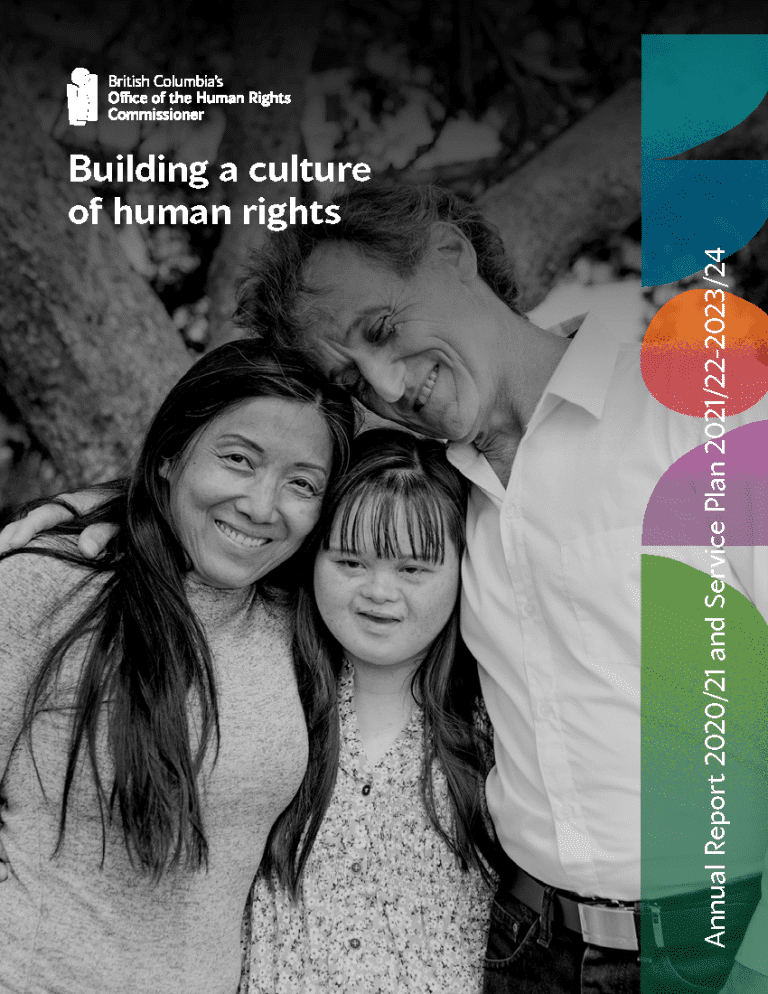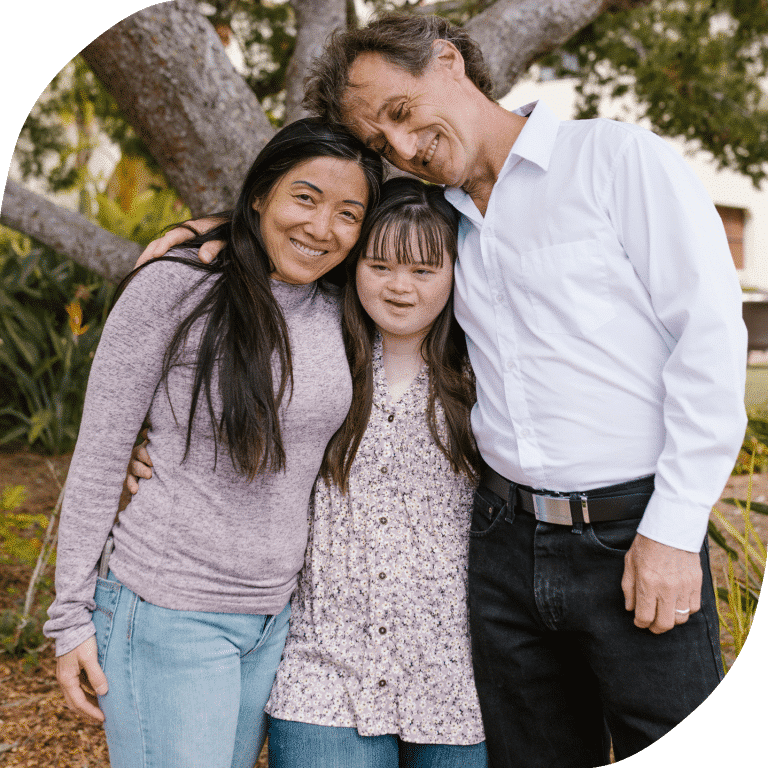A key accountability mechanism for our work is the Commissioner’s yearly budget, service plan and annual report submission and presentation to the all-party Select Standing Committee on Finance and Government Services of the Legislative Assembly of B.C.
A three-year Service Plan (2022/23–2024/25) flows from our Strategic Plan and outlines the objectives and activities we envision undertaking in each of our priority areas in order to fulfill the Commissioner’s mandate.
Our Annual Report (2020/2021) tells the story of our work and outcomes resulting from the previous fiscal year. As we grow as an organization, we plan to use our annual reports as an opportunity to highlight the impact our work is having on human rights, balancing numbers with stories and context to ensure a human rights-based approach to evaluation. We will ask people in British Columbia to work with us to tell our story of change.
More resources

If the version available via this page is not accessible for you, please feel welcome to contact our Office to request a printed copy or another format that meets your needs.
Executive summary
Translations of the executive summary are available in:
Arabic | Farsi | French | Korean | Punjabi | Tagalog | Traditional Chinese | Simplified Chinese | Vietnamese
In 2020/21, BC’s Office of the Human Rights Commissioner (BCOHRC) focused on building our organization—in size, structure and reach. We focused on creating meaningful impact in our strategic priority areas while continuing to establish our policies, practices and culture as a new, innovative and dynamic human rights organization in B.C.
Strategic priority highlights
Our Strategic Plan 2020/21-2024/25 outlines five program-related priorities: discrimination under B.C.’s Human Rights Code, decolonization, hate and the rise of white supremacy, poverty as a cause and effect of injustice and inequality and human rights protections for those detained by the state. The following are highlights from initiatives we undertook in 2020/21 in support of these priorities:
- A foundational priority for BCOHRC is to restructure laws, policies and practices that create and sustain discrimination. For example, in 2020/21 we worked with the Human Rights Tribunal and human rights clinics across the province to develop a “No Wrong Door” approach to improve access to the human rights system (read page 44). We also managed 83 Special Programs, which allow duty holders to prioritize historically marginalized groups in employment, tenancy and other Code-protected areas (read page 65).
- Another key priority is decolonization: supporting the rights of Indigenous peoples, the self-determination of Nations and work to dismantle structures of colonialism. Our 2020/21 work focused on increasing the accessibility and relevance of the human rights system for Indigenous peoples (read page 45), supporting implementation and monitoring of the Declaration on the Rights of Indigenous Peoples Act (DRIPA) and raising awareness of Indigenous experiences of discrimination and the rights of Indigenous peoples more generally (read page 21).
- Our Office is also committed to reducing the presence of hate in our society. We are focused on improving research and data on the root causes of manifestations of hate; reducing misinformation that feeds stereotyping, fear and violence; and improving the effectiveness of legal responses to hate. For example, in 2020/21, we launched a province-wide anti-racism campaign in 77 B.C. communities (read page 51).
- Poverty is a key human rights issue in B.C., and we are working towards effective and meaningful domestic protections for economic rights and dismantling discrimination against people living in poverty (read page 25). In 2020/21 BCOHRC released a research brief with recommendations to add “social condition” to B.C.’s Human Rights Code as a protected characteristic (read page 64).
- We all have the right to be free from arbitrary detention, abuse of power and other unfair treatment if we are lawfully detained. In 2020/21, BCOHRC focused on reducing overuse of involuntary mental health detention and reducing discrimination in policing practices (read page 27). We also made recommendations for protecting the human rights of those being detained during the COVID-19 pandemic (read page 70).
Highlights of our 2020/21 impact
Monitoring, evaluation and continuous improvement are embedded into each stage of our development as we build, grow, sustain, refine and renew our organization and work (for more on our evaluation plan, read page 82). In 2021/22 we established our evaluation framework and a set of draft indicators to measure our progress year over year. Our evaluation activities will illustrate the extent to which we’ve been successful at holding respectful relationships and accountability to all stakeholders, integrating publicly accessible educational and guidance resources and forums, surfacing key human rights issues to inform recommendations we provide to the B.C. government and other duty holders, developing legal arguments to influence case law and, internally, building human rights-based policies, practice and organizational culture. Our annual report is structured around these key areas of evaluation.
Holding respectful relationships and demonstrating accountability
Relationship building is the foundation of all human rights work. In 2020/21, BCOHRC reached out to the public through a series of eight regional engagements (read page 38), engaged extensively with Indigenous governments and community leaders (read page 42), provided information and referrals to over 2,600 people who contacted us (read page 35) and built an accessible, multilingual website and engaging social media presence (read page 46). We also conducted province-wide polling to ensure our priorities are aligned with the needs and interests of British Columbians (read page 33).
Building educational and guidance resources and forums
In the context of a disturbing rise in reported hate crimes (read page 23) over recent years and amplified by the pandemic, BCOHRC launched its first public education campaign in 2020/21. The “Am I racist?” campaign asked British Columbians to examine their internal biases through two sets of questions posed on large billboards and bus ads in 24 communities and through an interactive web experience featuring timelines, activities and resources (read page 51). 2020/21 also saw the launch of our animated Human Rights 101 video short and accompanying learning resources about human rights protections in B.C., which were designed to simplify human rights concepts for the public (read page 54).
Providing recommendations to improve systemic human rights issues
In 2020/21, recognizing that some groups were harder hit by the COVID-19 pandemic than others, our Office joined a national call for a coordinated public sector strategy for the collection of race-based and other disaggregated demographic data to reveal health care inequities (read page 69). We later produced a report (followed by a webinar and additional resources) with recommendations for broader disaggregated data collection in B.C., which advocated the use of “the grandmother perspective” to prevent harm to marginalized communities (read page 57).
Emerging issue: COVID-19 pandemic
One major point of shared connection in 2020/21 was the COVID-19 pandemic, which altered our society and surfaced key human rights issues. This global emergency had impacts in each of our strategic priority areas, bringing the urgent need for human rights oversight in our province into stark relief. In response to the pandemic, BCOHRC issued extensive policy guidance to employers, landlords, service providers and individuals about how to ensure that human rights are protected in relation to urgent public health priorities (see page 68).
Another way we address systemic human rights issues is by conducting inquiries, which allow us to report on and/or provide recommendations to the B.C. government and other duty holders. Over the course of the 2020/21 period, we also began preparations for our first public inquiry, Hate in the Pandemic, including feasibility research, setting up guides and terms of reference, and developing an inquiry website (read page 66).
Developing legal arguments to influence case law
BCOHRC aims to improve human rights laws and systems in B.C. One approach is using the Office’s power to intervene in court cases that may impact human rights protections in B.C. In 2020/21 our Office filed its first intervention in a B.C. Supreme Court case, which involves the legal test for discrimination on the basis of family status (read page 73).
Building human rights-based policies, practices and culture
BCOHRC’s operational strategic priority is to create a strong and sustainable organization capable of generating progressive impact on human rights in B.C. In 2020/21 we used a rights-based approach in the development of our evaluation and reporting practices (read page 75); applied an equitable and accessible approach to recruitment to build a dynamic, diverse and inclusive team (read page 75); established operational systems and processes in alignment with our goals and guiding principles (read page 77) and implemented a unique visual identity that is recognizable and establishes the Commissioner as a credible voice advancing human rights in B.C. (read page 75).
Looking ahead: 2021/22–2023/24 service plan
Our service plan (2021/22–2023/24) flows from the above-mentioned strategic priorities and evaluation plan deliverables. It outlines the objectives, key performance indicators and a sample of the activities we envision undertaking over a three-year period to fulfil the Office’s mandate and to establish a baseline for setting future targets.
Some of our activities in the service plan period include launching our Hate in the Pandemic Inquiry (as we did in August 2021), releasing a second video from our empathy-building I Love My Human Rights series, hosting Human Rights Code educational workshops and developing guidance materials for those developing proof-of-vaccination policies at the current stage in the pandemic. Our work ahead also includes a second major public engagement campaign, continued work on human rights in policing (including a submission to the Special Committee on Reforming the Police Act) and much more (read page 81). As we do this work and more, we will also take stock of the state of human rights and the human rights system in B.C. (read page 82).
Budget and expenditures 2020/21
In 2020/21 BCOHRC spent $4.7 million of our $5.5 million operating budget and fully expended our $1.2 million capital budget (read page 94). Going forward, in the period covered by our service plan, we have been approved an operating budget of $6.8 million in 2021/22, $6.7 million in 2022/23 and $6.7 million in 2023/24, and a capital budget of $35 thousand per year.
- Previous publication:Budget submission 2021/22–2023/24
